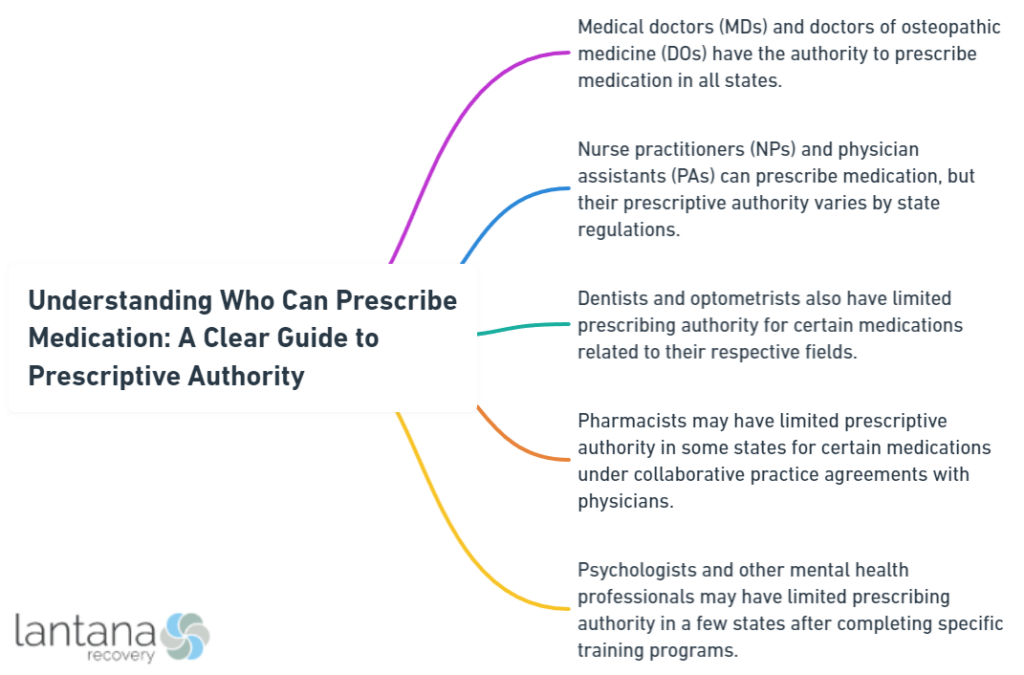Have you ever wondered who can prescribe medication beyond your family doctor? Legal authority to prescribe stretches across various healthcare roles, from nurse practitioners to psychiatrists, each with specific prescribing rights. Our guide will walk you through the providers who can offer prescriptions, the extent of their authority, and how it can differ from state to state.
Key Takeaways
- Healthcare professionals with prescriptive authority range from primary care providers to specialized practitioners such as nurse practitioners, physician assistants, and psychiatrists, though the extent of prescriptive power varies based on their role and state regulations.
- Nurse practitioners and physician assistants’ prescriptive authority varies by state, with some states granting full autonomy, while others require varying levels of physician collaboration or oversight.
- The Controlled Substances Act categorizes drugs into five schedules according to their potential for abuse and medical use; healthcare professionals, including MDs, DOs, NPs, PAs, and dentists, must adhere to these classifications and state-specific regulations when prescribing these substances.
Types of Healthcare Professionals with Prescriptive Authority

When it comes to prescribing medications, a wide array of health care professionals hold the reins. This prescriptive authority extends to:
- Primary care providers
- Specialists
- Advanced practice nurses
- Medical doctors
- Nurse practitioners
- Physician assistants
- Psychiatrists
Each group brings its unique expertise to the table, shaping the landscape of modern healthcare. These healthcare professionals, equipped with their specialized training and experience, play a pivotal role in prescribing medication, managing patient care, and ultimately, shaping patient outcomes.
However, the extent of prescriptive authority varies among these professionals. While some can prescribe a wide range of medications, others have specific limitations, often depending on their field of specialization and the state regulations governing their practice. Let’s delve into the prescriptive authority of some of these key healthcare professionals.
Medical Doctors (MDs) and Doctors of Osteopathic Medicine (DOs)
Medical Doctors (MDs) and Doctors of Osteopathic Medicine (DOs) hold a significant place in the healthcare ecosystem. With the highest degree of prescriptive authority, they are equipped to:
- Prescribe a diverse range of medications to manage and treat various health conditions
- Provide comprehensive medical care
- Perform surgeries and procedures
- Diagnose and treat illnesses and injuries
- Conduct physical examinations and order diagnostic tests
- Provide preventive care and health education
This ability is backed by their rigorous training and education in diverse medical fields, placing them at the forefront of healthcare delivery.
Whether it’s a simple cold or a complex cardiovascular condition, MDs and DOs provide expert medical advice, prescribe appropriate medications, and monitor patient progress. They serve as the cornerstone of healthcare delivery, with their broad prescriptive authority playing a crucial role in patient outcomes.

Nurse Practitioners (NPs)
Next on our list are Nurse Practitioners (NPs), who play an increasingly important role in today’s healthcare landscape. NPs, as advanced practice nurses, have the authority to prescribe medications. However, their prescriptive authority varies significantly by their level of certification and the state regulations governing their practice.
In some states, NPs are granted full autonomous practice, allowing them to prescribe Schedule II-V drugs independently. In others, they are required to enter into collaborative practice agreements or have physician oversight to prescribe medication. Beyond prescribing medications, NPs are also authorized to order X-rays, conduct other diagnostic tests, and counsel patients based on their scope of practice in their respective states.
Physician Assistants (PAs)
Physician Assistants (PAs), another critical group in healthcare, are capable of diagnosing illnesses, developing treatment plans, and prescribing medications. However, their authority to prescribe comes under the supervision of a physician. As a physician assistant, the degree of physician supervision required for PAs and the scope of medications they can prescribe vary according to state law.
Despite the need for physician oversight, PAs work in various healthcare settings such as doctors’ offices and hospitals. Here, they exercise a significant degree of autonomy within their roles, contributing to the diversity and flexibility of healthcare delivery.
Alcohol Rehab South Carolina
Alcohol rehab in South Carolina offers individuals struggling with alcohol addiction a chance to reclaim their lives. With a variety of treatment options available, including outpatient and residential programs, individuals can find the support they need to overcome addiction. These programs often incorporate therapy, counseling, and support groups to address the underlying issues contributing to alcohol abuse. Located in serene environments, South Carolina alcohol rehab centers provide a peaceful setting conducive to healing and recovery. Additionally, many facilities offer personalized treatment plans tailored to each individual’s needs, ensuring comprehensive care and long-term success in sobriety. If you or someone you know is battling alcohol addiction, seeking help from a reputable rehab center in South Carolina can be the first step towards a healthier, substance-free life.
Mental Health Medication Prescribers

Mental health is an integral aspect of overall wellbeing, and it’s no surprise that there are healthcare professionals specialized in prescribing mental health medications for various mental health conditions. Among these professionals are:
- Medical doctors
- Nurse practitioners
- Psychiatrists
- Psychiatric nurse practitioners
Each equipped with specialized training and expertise.
Psychiatrists, for instance, are medical doctors with expertise in diagnosing, treating, and preventing mental health disorders. Their ability to prescribe a wide range of medications and provide psychotherapy makes them an indispensable part of the mental health care system. In many cases, patients might be referred to psychiatrists instead of relying solely on their primary care doctors, thanks to their specialization in mental health and their ability to prescribe specific mental health medications.
Psychiatrists
Psychiatrists, as medical doctors specializing in mental health, bring a unique perspective to the healthcare table. They utilize medical and psychological tests to assess mental and physical aspects of psychological conditions and formulate a diagnosis.
Their specialized training and expertise enable them to prescribe mental health medications, as they have a wide range of options that alter chemical signaling in the brain to minimize psychiatric symptoms. Furthermore, the treatment provided by psychiatrists often includes a combination of medication management and psychotherapy, providing a holistic approach to mental health care.
Psychiatric Nurse Practitioners
Psychiatric nurse practitioners (PNPs) are another group of professionals playing a vital role in mental health care. As advanced practice registered nurses (APRNs) with specialized training, PNPs conduct comprehensive assessments and manage both chronic and acute mental illnesses across the lifespan.
In addition to their diagnostic capabilities, PNPs are also adept at:
- Ordering and interpreting diagnostic studies and lab tests
- Providing preventative care such as screenings and immunizations
- Prescribing medications
- Utilizing a variety of psychotherapeutic techniques, including counseling
- Providing additional treatments such as light therapy for seasonal depression.
Their responsibilities can range from direct patient care in psychiatric hospitals to ongoing treatment management in private practices.
Dental and Other Medical Professionals

Prescriptive authority is not confined to healthcare professionals treating systemic diseases; it extends to other specialties as well. Dentists and optometrists, for instance, have prescriptive authority related to their specific fields, including dental treatments and eye conditions.
Dentists are authorized to prescribe medications directly related to dental treatment and dental surgical procedures such as painkillers, anti-inflammatory medications, and antibiotics for tooth infections. On the other hand, optometrists are authorized to prescribe therapeutic drugs to treat ocular diseases and relieve symptoms, as well as diagnostic drugs to identify certain eye conditions.
Dentists
When you think of dental care, painkillers and anesthetics might come to mind. Indeed, dentists are authorized to prescribe a variety of medications related to dental treatment and surgical procedures, including analgesics for pain relief, anesthetics for numbing during procedures, and antibiotics to prevent or treat infections.
In addition to these, dentists can prescribe specific medications for particular dental health issues. For instance, they may prescribe fluoride toothpaste for patients with weak teeth or susceptibility to decay, and medications to stimulate saliva production for those with dry mouth conditions.
Optometrists
Optometrists, the primary healthcare practitioners for our eyes, are authorized to prescribe therapeutic and diagnostic drugs for ocular diseases and conditions. They can prescribe a range of medications, including:
- Antivirals
- Antibiotics
- Antifungals
- Anti-inflammatory drugs
- Antihistamines
The specific prescription medication that can be prescribed may vary depending on the state’s regulations.
However, it’s important to note that the prescriptive authority of optometrists in the U.S. varies by state. While some states authorize the prescription of oral steroids by optometrists, others may have restrictions on such prescriptions.
State Regulations and Prescriptive Authority
State regulations play a significant role in determining the prescriptive authority of healthcare professionals. Various states grant different levels of autonomy to nurse practitioners (NPs) and physician assistants (PAs), which significantly impacts their ability to prescribe medications.
Over time, the prescriptive authority for advanced practice providers such as PAs and NPs has expanded primarily through modifications to state legislation. However, despite these legislative changes, there remain disparities among states in the ability of PAs and NPs to prescribe controlled substances, emphasizing the importance of state regulations in shaping prescriptive authority.
Full, Reduced, and Restricted Practice
Full, reduced, and restricted practice levels for NPs and PAs are determined by state regulations, impacting their ability to prescribe medications and operate independently. In full practice states, NPs have the authority to diagnose, order tests, prescribe medications, and operate independent practices subject to meeting any state-specific requirements. In contrast, reduced practice states may limit certain medications and independent operation, and restricted practice states require physician supervision or delegation for all aspects of NPs’ practice.
However, the scope of practice for PAs is a little different. PAs are generally required to have a supervisory or collaborative relationship with a physician, impacting their scope of practice, including prescriptive authority. The nature of this relationship, as well as the types of prescriptions they can issue, particularly for controlled substances, often require detailed joint practice agreements or additional education.
Changes in State Regulations
Changes in state regulations can expand the prescriptive authority of advanced practice providers. However, the adoption of such authority may be gradual and subject to state-specific restrictions. For instance, Utah recently became the 27th state to grant full practice authority to NPs, allowing them to perform the full scope of practice without physician oversight.
Despite legislative changes allowing greater prescriptive authority, not all eligible NPs and PAs pursue or obtain such authority. For example, in Washington state, only 60% applied following new legislation. This highlights that while changes in state regulations can enhance prescriptive authority, the actual adoption may vary significantly among healthcare professionals.
Alcohol Rehab Centers in South Carolina
Alcohol rehab centers in South Carolina offer a range of services to individuals struggling with alcohol addiction. These centers provide comprehensive treatment programs tailored to the specific needs of each patient. With a focus on evidence-based therapies and personalized care, individuals can receive support through detoxification, counseling, and therapy sessions. Additionally, many alcohol rehab centers in South Carolina offer aftercare programs to help individuals maintain sobriety and prevent relapse after completing their initial treatment. By seeking help from these reputable facilities, individuals can take the first step towards recovery and reclaim control of their lives from alcohol addiction.
Controlled Substances and Prescriptive Authority

Controlled substances are drugs that contain medicinal qualities and possess addictive properties, and they are regulated by the government. These substances are carefully monitored to prevent misuse and ensure public safety. These substances are categorized into five schedules based on their potential for abuse, safety, and dependence liability.
The categorization into schedules helps regulate the prescription of these substances, ensuring they are used responsibly for medical purposes. For instance, Schedule II controlled substances, which include drugs like amphetamine, codeine, and hydrocodone, are classified based on a higher potential for abuse.
In contrast, substances with the lowest abuse potential are placed under Schedule V, which consists of preparations with limited quantities of narcotics and stimulants, such as certain analgesics.
Schedules of Controlled Substances
The Controlled Substances Act categorizes controlled substances into five schedules based on factors such as medical use, potential for abuse, and safety or dependence liability. Schedule I controlled substances have no currently accepted medical use in the United States and present a high potential for abuse.
On the other end of the spectrum, Schedule V controlled substances exhibit a low potential for abuse in comparison to Schedule IV and usually consist of preparations with limited quantities of certain narcotics, such as codeine for coughs and phenylephrine for congestion. This classification helps healthcare professionals and patients understand the potential risks associated with these medications.
Healthcare Professionals and Controlled Substances
Healthcare professionals, who provide professional medical advice, include:
- MDs
- DOs
- NPs
- PAs
- Dentists
have varying levels of authority to prescribe controlled substances, depending on their specialization and state regulations. Physicians with MD or DO designations can prescribe controlled substances, given they have a valid DEA license.
Dentists are authorized to prescribe controlled substances like sedatives for dental procedures within strict guidelines. Meanwhile, PAs may face state-specific prohibitions on prescribing Schedule II controlled substances, along with other possible restrictions.
State boards of nursing regulate NP prescriptive authority; federal law schedules controlled substances, affecting NPs’ prescribing rights.
The Importance of Collaboration in Prescribing Medication
Collaboration and communication between healthcare providers are crucial in prescribing medication. Open communication fosters better understanding and coordination of care, which is especially important when multiple healthcare professionals are involved in a patient’s care.
During the COVID-19 pandemic, for instance, the Centers for Medicare & Medicaid Services (CMS) provided regulatory flexibility that allowed Advanced Practice Registered Nurses (APRNs) to practice more freely. This flexibility played a pivotal role in ensuring collaborative and effective healthcare delivery during a challenging time.
Communication Between Providers
Open and honest communication about prescription medications is vital for understanding and addressing issues of nonadherence. It improves the quality of doctor-patient discussions about medication management.
Effective communication in healthcare has several benefits, including:
- Fostering collaboration among healthcare professionals
- Resulting in comprehensive, integrated care
- Improving patient outcomes
- Enhancing patient satisfaction
This is particularly significant in mental health care, where psychiatric nurse practitioners collaborate with other healthcare professionals to provide comprehensive care for their patients.
Monitoring Patient Progress
Monitoring patient progress is an integral part of medication management. It involves ongoing assessment and necessary adjustments to the treatment plan based on the patient’s response to medication.
Effective medication management can:
- Improve a patient’s quality of life
- Reduce symptoms
- Prevent relapse
- Reduce the risk of adverse drug reactions
In addition, addressing common challenges such as medication non-adherence can lead to better patient outcomes and more efficient healthcare delivery.
Who Can Prescribe Schedule 8 Drugs
In many countries, the authority to prescribe Schedule 8 drugs is restricted to licensed medical professionals, typically physicians or specialists with prescribing privileges. These drugs, often classified as controlled substances due to their potential for abuse and dependence, require careful monitoring and management. The ability to prescribe Schedule 8 drugs comes with significant responsibility and is governed by strict regulations to ensure patient safety. Healthcare providers who can prescribe such medications undergo extensive training on their appropriate use, potential side effects, and the legal implications of prescribing controlled substances. Additionally, they must adhere to local laws and regulations, maintain accurate records, and exercise caution to prevent misuse or diversion of these powerful medications.
Summary
In conclusion, prescriptive authority is a multifaceted aspect of healthcare, spanning different professionals, from physicians and nurse practitioners to dentists and optometrists. State regulations play a crucial role in governing this authority, with changes in these regulations having the potential to expand the scope of practice for many healthcare professionals. Understanding the complexities of prescriptive authority and the importance of collaboration and communication in prescribing medication is key to effective patient care and improved health outcomes.
Frequently Asked Questions
Who prescribes medication to patients?
Physicians, including those with an MD or DO designation, are responsible for prescribing medications to patients. This also includes physician assistants, who can carry out similar tasks with limited oversight.
Which of the following types of professionals can write prescriptions for drugs?
In addition to doctors, nurse practitioners, physician assistants, veterinarians, and midwives can also write prescriptions for medication. Other health care professionals may have limited authority to prescribe specific medications based on their credentials.
Can a nurse prescribe medication?
Yes, nurse practitioners can prescribe medications in all 50 states, and in most states, they do not need a physician’s supervision to do so.
Can pharmacists prescribe in Washington state?
Yes, pharmacists in Washington state can prescribe legend drugs, including controlled substances and vaccines, under a collaborative agreement with an authorized prescriber. This information is as of the current regulations.
What is the role of state regulations in prescriptive authority?
State regulations determine the prescriptive authority of healthcare professionals, granting varying levels of autonomy based on state laws. State regulations play a crucial role in determining the extent of prescriptive authority for healthcare professionals.








